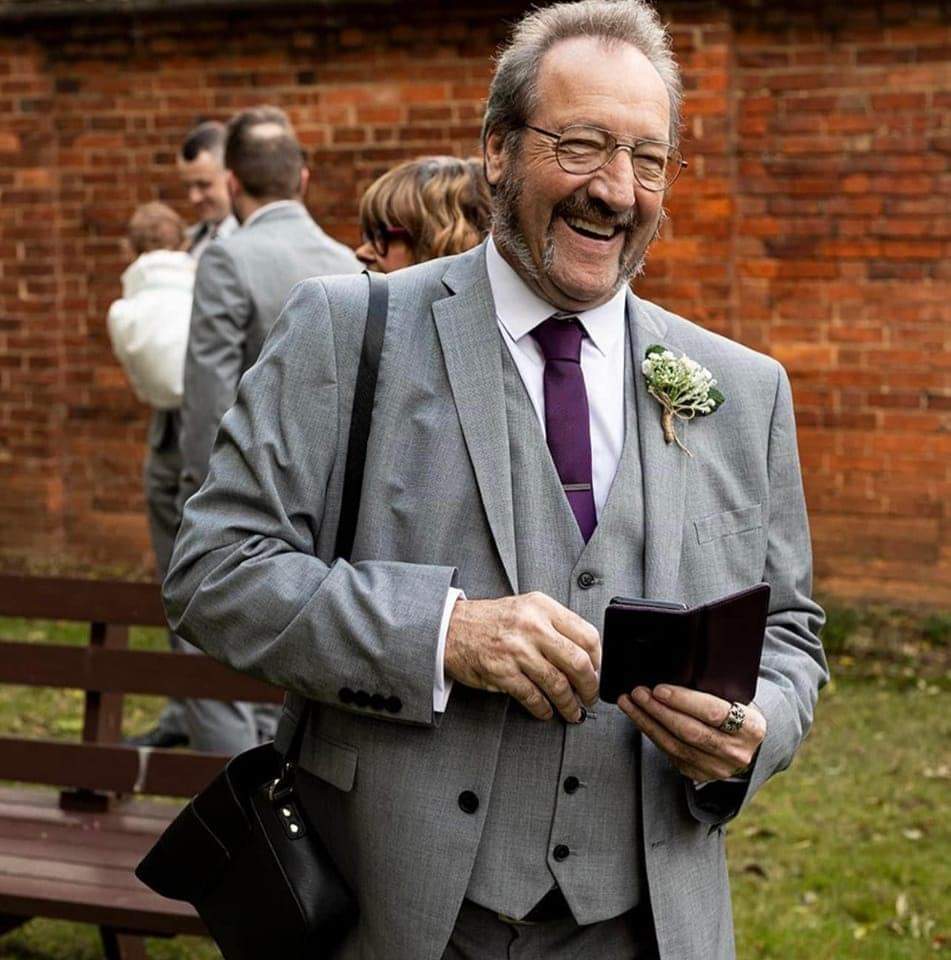The following story was shared by Jim’s wife, Deborah.
My husband, James Roy Booth, was born on 8th November 1954 and passed away with sporadic CJD on 13th February 2022, three weeks after diagnosis.
Our daughter got married on November 13th 2021, Jim gave her away and was the life and soul of the party. A few weeks later on November 27th, we went out for a meal with his family and had a lovely night. Jim has always been very sharp minded, good with numbers. He would walk 5-7 miles a day after the Christmas period to lose weight and loved being out walking our dog.
In mid-December 2021, Jim went for a yearly diabetic test which involved having dye put into his eyes. Coming out of the test, he complained that his eyes were burning and the next morning they were still burning and blurry. He decided to stop driving and I told him he should go and get an eye test, which he booked for 30th December. We had a good Christmas and New Year and he cooked Christmas lunch, as usual. A week after his eye test he collected new glasses but they failed to improve his vision.
In early January, Jim became unstable on his feet. His concentration was lacking and his eyesight was still blurry. I suggested that he see a doctor and he made an appointment for Thursday 13th January 2022, he refused to let me go in with him. Jim said the doctor had told him that it was old age and that they would text him in 7 months, I was confused and explained to him that they wouldn’t normally say they’d contact someone in 7 months. He later told our daughter they would be texting him in 7 days.
On Wednesday 19th January, I checked his phone and noticed that he had missed an appointment for that Monday, the 17th. I phoned the doctors but they wouldn’t share any information with me because of data protection. Jim said he didn’t know the appointment was on his phone, the truth was that he was unable to read it.
We tried to make an appointment with the doctors over the phone on Thursday 20th January, they couldn’t get him in until three weeks later. In the meantime, Jim began doing odd things. He would be fine during the mornings, washing his hair and doing his normal routine. However, toward late afternoon he would get up and down from his seat repeatedly, and kept ripping up tissues and putting them in a pile in his hand. I would tell him to sit down and watch TV, but he would respond that ‘it’s not going into my head’.
On Friday 21st January we tried to get an earlier doctor’s appointment, going down to the surgery in person. The receptionist commented that Jim did appear muddled, it was as though he was drunk. The receptionist told us that we could sign a proxy form to enable us to speak for Jim, but that they still wouldn’t give an earlier appointment. My daughter ordered and advised us to take a urine test for him the following day to rule out some possibilities.
We had a good day on Saturday 22nd, but as night approached Jim was unsettled and wandering. He took all my framed photos down and said he was looking for something. The urine test showed high glucose levels and so we called 111. We attended A&E at Leicester Royal Infirmary on Sunday 23rd January and Jim was admitted to hospital and his symptoms deteriorated very quickly. His hands and fingers were bent and he required a beaker with a spout to drink from. Whilst in hospital, he fell from his chair which meant he had to stay in bed and be hoisted. Following an MRI scan, Jim was diagnosed with having CJD.
Following support and input from the CJD team in Edinburgh, who recommended he be moved as quickly as possible, Jim was moved to a Melton Hospital for end-of-life care. Whilst there, he had seizures and was unable to see. Jim passed away on Sunday February 13th 2022, just three weeks after diagnosis. We had been married for 41 years. It was heart-breaking.
In our experience, there was a lack of knowledge of the disease amongst hospital staff. In my view, hospital staff need to be more aware of and in my opinion require training regarding rare diseases like CJD and how to care for the individual.
The CJD Support Network would like to thank Deborah for sharing the experiences of her family, which we know many people within the network will relate to. As a charity, we are committed to advocating for awareness and appropriate support. We continue to look for new ways of contributing to raising awareness of CJD and rare disease care, including amongst medical staff. We have recently been added to the ‘Medics4RareDiseases’ directory (here) and our helpline and factsheets are available for any medical or care staff wishing to learn more about CJD. Guidelines for social workers and those caring for a patient with CJD can be found on the government website here.


